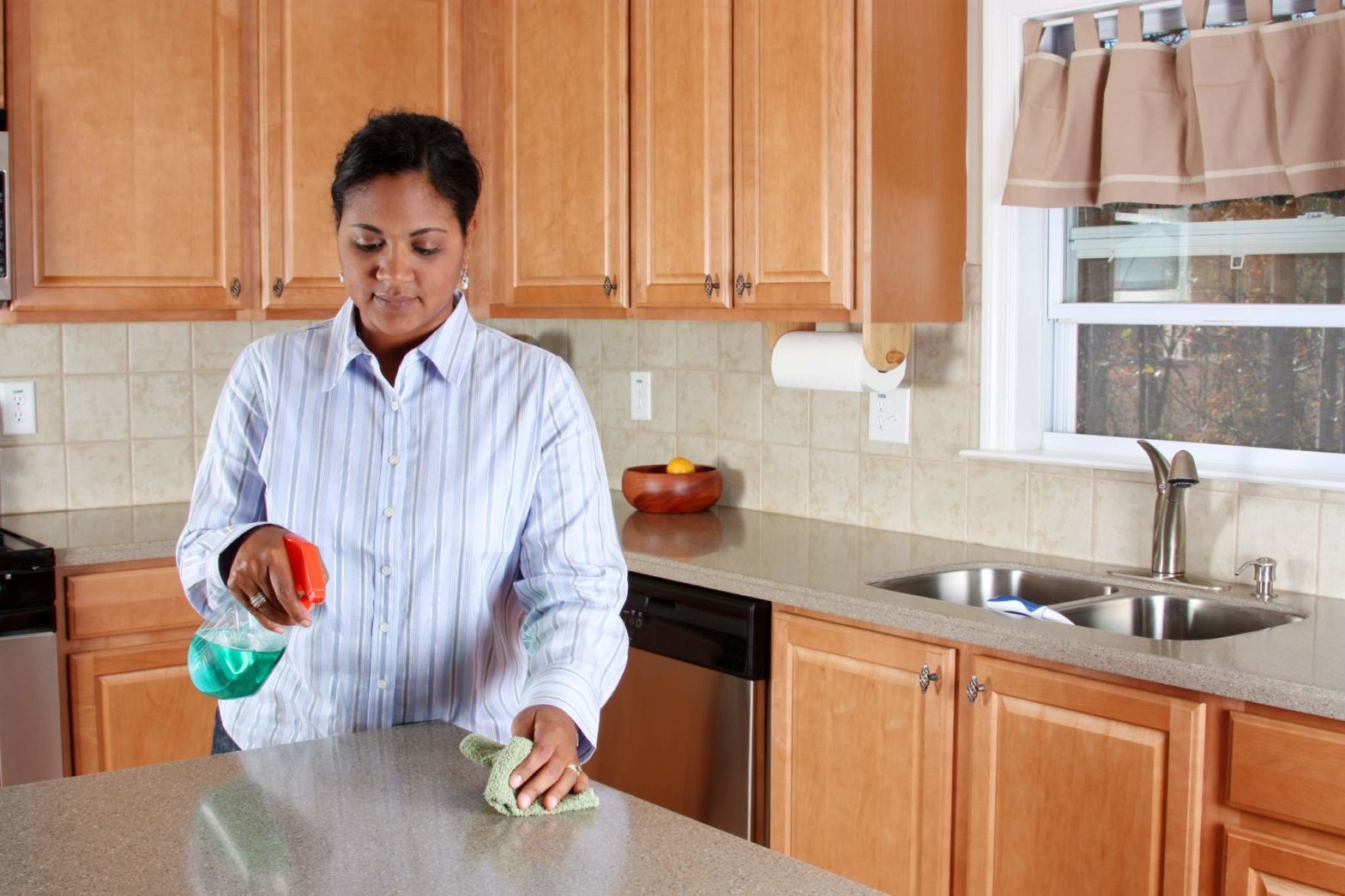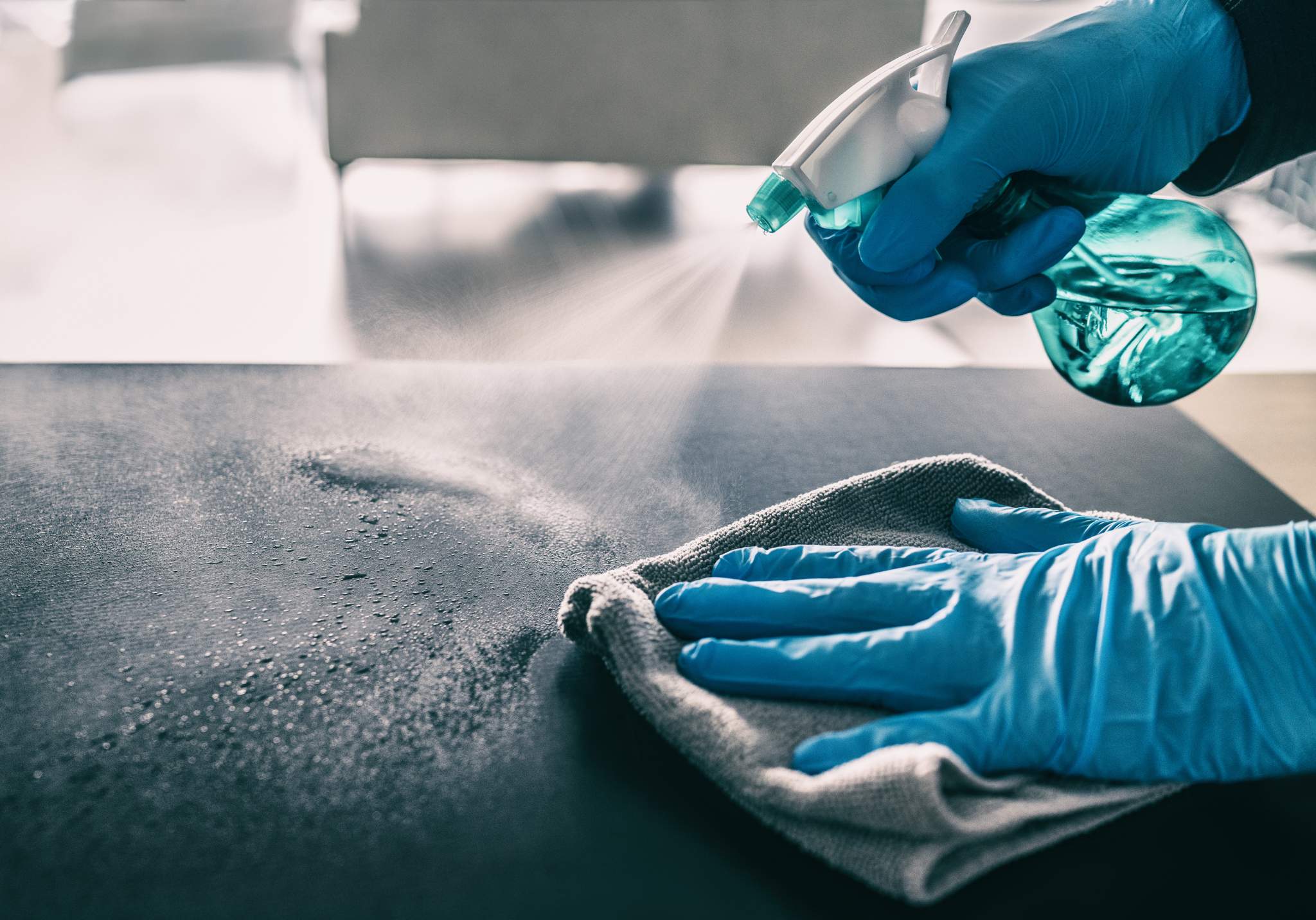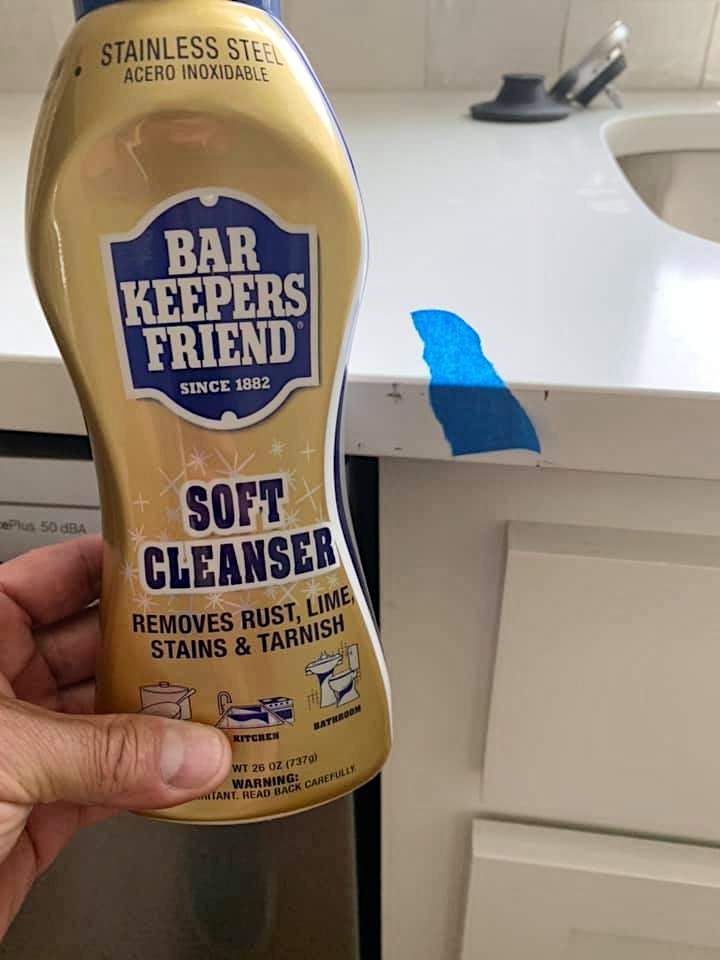
We’re all aware that it’s important to wash our hands and disinfect the kitchen counters after working with raw meat or eggs. We know that bacteria and viruses can survive on surfaces for varying amounts of time. Today, in the midst of the Covid-19 pandemic, it’s more important than ever to understand how to properly disinfect surfaces.
Most granite countertops require regular cleaning to stay in good condition, but not all granite is the same. Generally, the darker the granite, the less obvious the dirt and the easier it is to clean when it is stained. But lighter granite, especially very light, can start to show dirt and grime fast.
The best way to ensure that you’re avoiding cross-contamination or exposure to a virus that has been left on a surface is by sanitizing countertops both before and after every use.
Quickly wiping down a surface with a paper towel or a premoistened wipe doesn’t thoroughly clean and disinfect that surface. We have a tendency to rush through this process with a few quick sprays and wipes, but this often doesn’t allow the cleaning product to work effectively.
The general rule for disinfecting a surface is “The longer, the better.”Letting your disinfectant remain on your surface for a minute before wiping them clean ensures that it has a chance to eliminate bacteria and viruses as fully as possible.
What about the stains?
The most important thing is to lift stains before they have a chance to set. It’s critical to take the time to wipe the stain off right after you spill something, especially if it’s something especially acidic, like lemon, ketchup or wine.
Granite’s worst enemies:
All foods or liquids can be damaging for countertops if they are allowed there for too long a time. But the worst ones in terms of most apparent discoloring are fruits, coffee, koolaid, vegetables, tomato-based sauces, and soda. Clear liquids can discolor as well, just that their effect are less obvious to the eyes.
If you do discover a stain on your countertop, you’ll need to use a special granite cleaning solution for the cleaning.
What disinfectant is safe for granite countertops?
Many different household disinfectant brands and formulations claim to kill 99.9 percent of germs. However, many of them can pose a risk to a natural stone surface. Bleach, vinegar, the ingredients in Lysol, and others can cause permanent damage, especially if used incorrectly.
Acids, such as vinegar and even lemon juice, can break down the sealant that is used on stone countertops. Clorox and Lysol sprays and wipes are convenient, but they are not safe for granite countertops. They rarely contain bleach, but they do generally contain citric acid to help remove soap scum.
Avoid using bleach as well. It’s a great disinfectant, but it can dull your counter’s finish and even permanently discolor the granite. The fumes can also be pretty harsh, so it’s best to not use bleach in the kitchen.
Finally, glass cleaners may seem like a great way to make sure your counters shine, because they do such a great job of removing fingerprints and water spots on windows, but they can actually dull the the finish on your granite countertops. They’re not designed to be used on porous surfaces like natural stone.
If you’ve used these cleaners before, don’t worry—these effects aren’t immediate. But using them frequently will break down the sealant on your counters. Avoid harsh cleansers in general in order to keep your counters looking their best.
For daily use, hot water and dish soap will be sufficient for daily sanitizing. We’re advised to wash our hands with soap and water, after all. The same simple cleanser will work for your countertops, and soap will not harm your surface, although it does need to be rinsed thoroughly to avoid the buildup of a dull film.
If you want more disinfecting power, 70% isopropyl alcohol will do the trick. Don’t dilute it – the CDC has stated that its effectiveness for killing germs “ HYPERLINK “https://www.cdc.gov/infectioncontrol/guidelines/disinfection/disinfection-methods/chemical.html”drops sharply when diluted below 50% concentration.” A bottle of rubbing alcohol is already diluted to reach that 70 or 91% range. So keep a bottle of 70% isopropyl alcohol on hand for disinfecting surfaces.
If your sponge has been sitting around in your sink, don’t use it to wipe your counters—used sponges can hold onto dangerous bacteria and give it an environment where it can multiply. Disinfect your sponges by putting them in the dishwasher when you run it.
One of our favorite cleansers
Keep your countertops well-sealed.
A well-sealed granite countertop is relatively impervious to bacteria.
The most important thing you can do to keep your counters looking their best and easy to keep clean is to make sure they’re well-sealed. Natural granite is porous and can harbor bacteria, espcially when it’s unsealed. Keeping your sealant in good shape by avoiding harsh chemicals will help prevent bacteria from settling in the tiny pores and crevises present in the stone.
Did you know ?Quartz is one of the most durable and hygienic countertop surfaces made from a mixture of natural minerals held together using polymers and resin. As a result,quartz countertops are non-porous with nowhere for bacteria to hide. Daily recommended maintenance for your quartz countertop is easy too — all you need is a non-abrasive cleaning cloth with soap and water.
How to Clean and Disinfect your Granite Countertops
Now that you understand what products are safe for your countertops, let’s go through the steps for cleaning and disinfecting them.
There are five steps to thoroughly clean and disinfect your counters: preparation, cleaning, disinfecting, rinsing, and drying.
Preparation:Remove small appliances and other items on the countertops so that you can access the entire surface. Get rid of any crumbs to avoid scratching the surface.
Cleaning:Fill the sink or a bowl with warm water and dish soap. Use a clean soft cloth or a clean sponge to wipe down the surface. One rinse will cut down on soap left on your counters after the disinfecting step, or if you’re not disinfecting this time, rinse and dry thoroughly after this step.
Disinfecting:Use a spray bottle with isopropyl alcohol to spray your countertops, and wait at least one minute in order to ensure that it has a chance to work fully.
Rinsing:Use a clean soft cloth to wipe up the disinfectant, and then rinse your cloth and wipe down the counters again to make sure all the soap and disinfectant is removed and your counters are shining.
Drying: Finally, wipe your counters dry with a clean towel to avoid water spots.
Conclusion :
It’s easy to keep your granite countertops disinfected, which is all the more important while we’re in the midst of a pandemic. With these simple steps, you can disinfect your counters after unpacking your groceries to help keep your family safe, and clean thoroughly after preparing foods that may carry harmful bacteria. You don’t need expensive cleaning products, either—soap, water, rubbing alcohol, and clean cloths are all it takes to keep your counters healthy.










